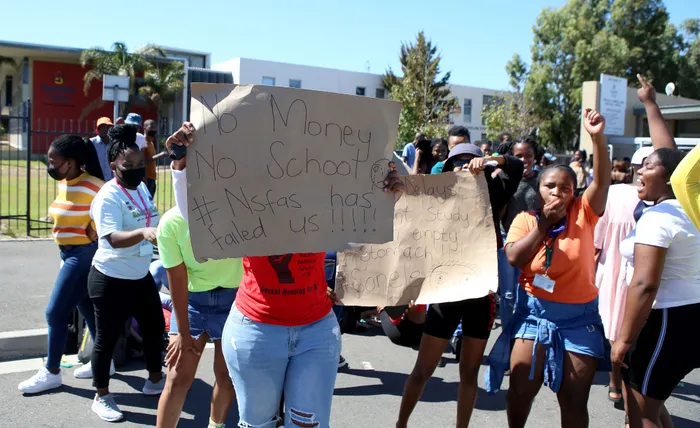
Students protesting over National Student Financial Aid Scheme (NSFAS) payment issues. Minister of Higher Education Buti Manamela commits to resolving pressing issues within the NSFAS.
Image: Independent Newspapers Archives
Minister of Higher Education, Buti Manamela, yesterday acknowledged that the country's post-school education and training system remains challenged and fragmented, and he has committed himself to stabilising the embattled National Financial Aid Scheme (NSFAS) within the next three months.
Manamela’s promise comes just days after reports indicated that the scheme's student accommodation management processes and the involvement of third-party partners are currently under a comprehensive legal review.
The announcement of the review came after the South African Students Congress (Sasco) reported last week that students had been evicted from a residence for EThekwini TVET college students because of challenges with NSFAS payments due to a delay in the submission of academic results.
NSFAS has said it is awaiting the outcome of this review, and once completed, it will implement the recommendations to enhance transparency, integrity, and efficiency in its payment processes.
Manamela, the recently appointed Minister, who replaced Dr Nobuhle Nkabane, addressed the media yesterday on the state of the country's post-school education system and the department’s vision for the sector.
To ensure a unified system, Manamela revealed that he has engaged all relevant stakeholders, including universities, colleges, TVET colleges, the Sector Education and Training Authorities (SETAs), and other stakeholders.
“The truth is that our post-school education system remains fragmented and uneven. Too many young people are locked out of opportunities. Too many skills taught are not the skills the economy needs. Too many institutions are underperforming. Government failures and funding models remain unstable.
“The system is not coherent enough to ensure that South Africa achieves a return on investment. After three decades of transformation, and 10 years since Fees Must Fall, and 10 years since our colleges were merged, we must acknowledge that progress, great as it must have been, is also uneven,” he stated.
Manamela indicated that stabilising the embattled NSFAS is his number one priority in a bid to reform the country's education system, while outlining six objectives aimed at integrating the country's post-schooling system.
“To give effect to this, we will stabilise the NSFAS in the next three months and set in motion a sustainable student funding model. To this effect, I've asked the CEO and the chairperson of the National Student Financial Aid Scheme to convene an urgent briefing and brief the nation, and in particular students, on the state of NSFAS and some of the challenges that they've been confronted with.
“To support their work, we have already started engagement with Treasury in filling some of the gaps that exist in terms of student funding.”
Manamela also revealed that there will be a Post-School Education and Training task team, which will be set up to lead the overhaul of the post-school education system, including some of the SETAs.
“We will establish the Post-School Education and Training Re-engineering task team, bringing together expertise from across sectors to guide the re-engineering of our system. We will also strengthen Sector Education and Training oversight and finalise their realignment to ensure that every SETA delivers measurable value. I have already asked the National Skills Authority to provide advice on what needs to be done to some of the SETAs that have been investigated,” he said.
Speaking on the student accommodation issues earlier this week, Sasco national office said the current NSFAS administrative capacity, or rather lack thereof, continued to expose students to dangerous and unfavourable conditions.
It said the challenges reflect poorly on NSFAS and its capacity to provide students with financial support relating to tuition, and equally financial support for accommodation and living allowances.
“Many students are facing eviction as private landlords threaten to remove our peers and fellow students, given that NSFAS has not paid these landlords.”
Sasco called for negotiations with all landlords in the country, who own accommodations housing students, to cease the evictions of any students, especially due to NSFAS.
“This is not unobtainable, given the rising monopolisation of the sector, by a handful of companies. Should any landlord with more than one building refuse to do so, their accreditation status should be revoked by NSFAS.
“All institutions should be mandated by the Department of Higher Education and Training (DHET) to declare and use their reserves to cover the cost of accommodation, in the short term, should the first solution not be implemented. The DHET should reach out to municipal authorities to source immediate short-term student accommodation. This includes public infrastructure.”